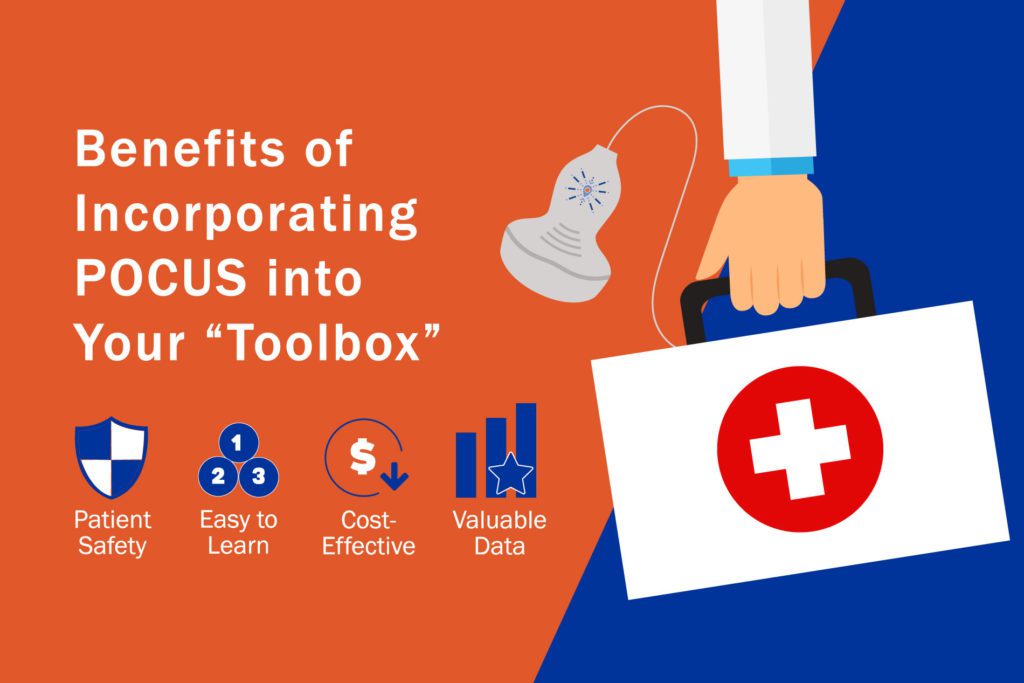Point-of-care ultrasound (POCUS) is transforming the medical field of the present and shaping the road of its future. With a history that dates back to 1880, POCUS is not necessarily new, but its impact and growth in the healthcare profession have seen a significant spike in recent years. As the technology has improved, the price of this modality has decreased, and its portability increased. Therefore, more healthcare workers have added POCUS to their medical toolbox.

And here’s why.
Increasingly, POCUS is becoming recognized for its benefits and is being integrated academically and professionally into the medical community. There is an expectation among professionals and patients for physicians to engage with POCUS. According to the POCUS Certification Academy™, the advantage of this small but powerful tool strikes four main chords:
- It prioritizes patient safety
- It’s easy to learn
- It’s cost-effective
- It offers valuable data
It enhances the user’s abilities and improves patient experiences by narrowing down otherwise broad differential diagnoses, providing faster answers, and serving to complement other examinations.
POCUS is Paving the Way for Better Patient Care
Picture this. A patient schedules an urgent appointment and presents symptoms of vaginal bleeding, lower abdominal pain, and cramping. Initial testing shows she’s pregnant and bleeding from the cervix, but there are no other abnormalities.
Before POCUS, her doctor would have had to perform bloodwork and order a formal ultrasound, which would have left the patient waiting for answers. But, in his article POCUS: A Small Tool With Big Benefits for Primary Care, Dr. Alex Mroszczyk-McDonald, M.D., details this exact experience and explains how he was able to utilize POCUS to avoid “a potentially life-threatening delay in care.”
While using POCUS did not change the patient’s care plan, it enabled “a faster and more accurate diagnosis” in a situation where the differential diagnosis would have otherwise been broad.
This case is one of the countless examples that demonstrate how medical professionals and patients alike are positively impacted by the use of POCUS.
POCUS and COVID-19
As it’s become viewed as a new standard of credibility and the advantages of using it have become more intersectional across medical specialties, POCUS has seen growth outside of traditional imaging and radiology.
This expansion is being propelled further as healthcare workers worldwide are finding POCUS to be a useful diagnostic tool during the COVID-19 pandemic. The Scientific American article Handheld Ultrasound Devices Are Speeding Diagnosis of COVID-19, describes how POCUS units have become a frontline defense in diagnosing COVID-19 cases. It shares how these handheld ultrasound devices “can reveal lung damage on the spot,” which allows doctors to see “whether individuals can breathe independently or need to be immediately put on ventilators.”
With POCUS being used to diagnose cases during the pandemic,
Society for Imaging Informatics in Medicine (SIIM) panelist and emergency medicine physician Dr. Elias Jaffa believes that there will likely be an acceleration of the acceptance of imaging outside of radiology.
Future POCUS Opportunities for the Medical Community
POCUS offers a win-win solution in medicine. It provides higher quality care at a lower cost and has been proven to impact patient and physician satisfaction positively. Through utilizing POCUS, doctors can collect more diagnostic information, and their findings often serve as a guide for their procedures.
Recognizing POCUS as a tool that will shape the future, the Anesthesia Patient Safety Foundation’s article Portable Point of Care Ultrasound (PPOCUS): An Emerging Technology for Improving Patient Safety, considers its rapid expansion to be a “revolution similar to what computing technology experienced in the 20th century, an acceleration in the development of portable, efficient, and affordable systems.”
The ability for POCUS to mold the medical field is limitless as it continues to flourish beyond expectations. The 2020 SIIM panelists acknowledged that even as medical schools and residency programs are working to incorporate it into their programs, POCUS technology is continually advancing and improving at accelerated rates.
Seeking a foundation in POCUS and becoming certified shows your current and future dedication to health, quality of care, and your patients. The future of medicine does indeed see POCUS leading the way. Preparing for this way forward now by incorporating it in your medical toolbox, is essential.
POCUS’s rapid growth, coupled with his personal experience with this sweeping modality, has driven Dr. Mroszczyk-McDonald to predict that in 20 years, a pocket ultrasound device may be considered as common among physicians as a stethoscope is now.
Will it be included in your toolbox?
Ready to get started on your POCUS journey? Check out our many certificates and certifications here.
Looking for additional inspiration? Sign up for our POCUS Post™ newsletter to receive monthly tips and ideas.





















